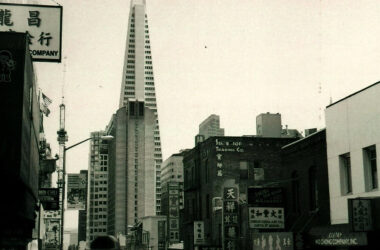A couple of months back, we turned on the Oscar awards, I think for the first time in well over a decade, mostly to see how Everything Everywhere All at Once would fare that evening. Given that the movie had already won a long list of awards leading up to the big show, it wasn’t too much of a surprise to see their streak continue at the Academy Awards—although, it was still impressive that the film took all of its 7 category awards.
Of course, a part of my excitement for Everything is because it’s the biggest piece of Asian-American media that has truly broken through into the mainstream here in America. In comparison to Asian movies and TV shows made and for audiences abroad—for instance, Parasite and Squid Game1—Asian-American cinema is its distinct genre. It features a blend of cultures and history, often immigrant stories that draw a contrast between the West and the East. They often feature an Asian-majority cast, though, of course, the main characters end up interacting with and intersecting, across a broad diversity of ethnicities in their natural American environments.
The genre is still nascent. A couple of years ago, there were the TV sitcom series Fresh Off the Boat, based on the memoir of a Taiwanese-American teenager who immigrated to Florida, and Kim’s Convenience, based on a stage play written by a Korean-Canadian who immigrated to Toronto, Canada. The breakout moment for Asian-American cinema, though, was the 2018 movie Crazy Rich Asians—the one that Everything supporting actor Ke Huy Quan credits as bringing him back to acting. These were all moderately successful, and set the foundation for Everything, Everywhere All at Once to break completely into the mainstream.
For decades, Asians in Hollywood were typecast into a small handful of roles: initially as villains, then as one-note kung fu masters, and then as minor supporting actresses2 to appeal to the Chinese box office. For adaptions from other media like books or anime series, Hollywood would recast the roles with white actors—though they’d get plenty criticized for the decisions. The thinking was that while the source materials told great stories, American audiences would respond better to familiar, usually white, faces3.
But now that both Crazy Rich Asians and Everything have proven that there are plenty of talented Asian actors and that they can carry a movie or TV show to receptive audiences, it feels like there’s suddenly a lot more media, at least compared to decades past. Shang-Chi; Turning Red; Always Be My Maybe; Beef; American Born Chinese; Joy Ride—and that’s just the major ones I can think of in the last 2–3 years. Most of these stories explore the duality of having family roots on the other side of the world while being or acclimating to becoming, an American—almost to the point of cliché.
I’m noticing a knock-on effect as well, where actors of Asian descent are cast more regularly in shows and movies, not quite to the extent of the “token black guy” trope but also not summarily shunned and casually absent from the big screen either. A John Cho or Kumail Nanjiani or Michelle Yeoh can lead a project as a matter of course, not relegated to the sidelines or reduced to an ethnic caricature. That may be the most exciting development: that it’s no longer a big deal to see these actors, in all manner of Hollywood cinema.
On a side note, South Korea has become an Asian cultural superpower in recent years, with just as much influence as Japanese cultural exports.↩
And it’s always young women.↩
One of my favorite YouTube channels, Accented Cinema, explores these topics as visual essays.↩




